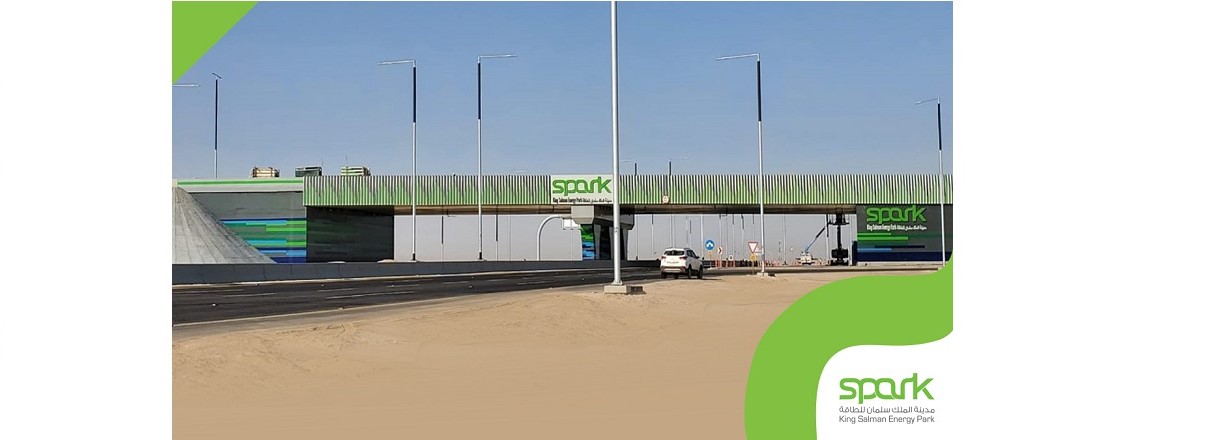
King Salman Energy Park (SPARK) has announced the deployment of multiple innovative construction solutions that promote sustainability. Many are being adopted in Saudi Arabia for the first time, as SPARK spearheads a drive for more environmentally-friendly building technologies that support the Circular Carbon Economy framework. They include “green” concrete that incorporates recycled materials, modular steel connections and Glass Fiber Reinforced Polymer (GFRP) rebar in bridge decks.
SPARK Chairman Dr Mohammad Yahya Al-Qahtani said: “SPARK is proud to announce a wide range of sustainability initiatives that are being deployed for the first time in the Kingdom of Saudi Arabia. These practices reflect our approach to construction that utilizes the latest advances in technology to maximize efficiency, minimize environmental impact and create a world-class energy ecosystem.”
Already recognized as the first industrial city in the world to obtain LEED Silver Certification, SPARK has become the first organization in Saudi Arabia to use Podzolic green concrete, a newly developed building material that uses local recycled materials as a partial replacement for cement. Material produced as a byproduct of local manufacturing processes is assimilated, while still offering the equivalent properties and durability. Capturing locally produced waste-materials and reemploying them in construction will help reduce landfill disposal and reduce CO2 emissions associated with cement production.
SPARK has also become the first entity in Saudi Arabia to pilot ConXtech steel connection technology for a commercial building. Incorporated into SPARK’s administration building, it is a modular method for steel erection allowing beams to be interlocked using non-metallic materials and slotted into position - rather than welding and bolting steel beams together. The benefits include increased construction efficiency, reduced material waste and improved site safety - and the 400 tons erected in two weeks by SPARK would have taken at least six weeks using conventional methods.

Additionally, in a first for the Middle East and Africa, SPARK has deployed Glass Fiber Reinforced Polymer (GFRP) rebar as a non-metallic replacement for epoxy steel reinforcement in bridge decks. This is a lighter, stronger, and easier to handle material that will not corrode, thus reducing waste and maintenance. Using GFRP rebar at SPARK will reduce the weight of steel reinforcement on bridges by 70%.
Meanwhile, as part of its effort to maximize the use of natural resources and improve the quality of the local environment, SPARK is evaluating the use of Liquid Nano Clay (LNC). This process allows nano-particles of clay to be bound to sand particles, thereby creating a soil that allows plants to flourish in hyper-arid areas where they otherwise would not survive. LNC enriches sandy soil to qualities comparable with high-quality black farming soil, retaining nutrients and high levels of water, and minimizing water wastage.
The construction approach adopted by SPARK is in line with the Circular Carbon Economy, a concept championed by Saudi Arabia and endorsed by G20 countries that aims to reduce, reuse, recycle and remove carbon emissions, as part of ongoing efforts to mitigate climate change and create climate-friendly energy systems that support sustainable development.
About King Salman Energy Park (SPARK):
King Salman Energy Park (SPARK) is a fully-integrated industrial city under development. Spanning an area of 50 square kilometers, SPARK is being developed with a vision to become the leading gateway to the regional energy sector, offering a complete spectrum of services to support business growth in the Kingdom.
SPARK offers infrastructure with international specifications for global investors in crude oil & gas industry and refining, petrochemical industries, electric power, and water production and treatment. SPARK will be comprised of five focal areas: Upstream, Downstream, Petrochemicals, Conventional Power, and Water & Wastewater.
Execution is planned over three phases. SPARK has completed 70% of its first phase, which consists of infrastructure, roads, utilities and real estate assets established across 14 square kilometers. Phase one is set to be completed in 2021. This is in addition to a dedicated three-square kilometer logistics zone and dry port.
The city has already attracted a large number of tenants and investors, exceeding the plan for its initial land/facility offering by over 15%, and accelerating future development.
www.spark.sa
